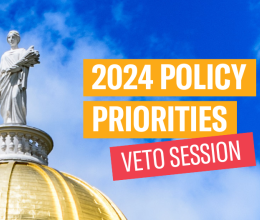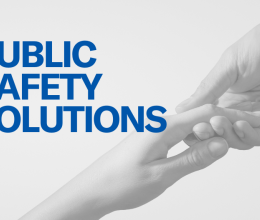
We all want to live in safe and healthy communities, and our criminal justice policies should be focused on the most effective approaches to achieving that goal. But the current system has failed us.
Vermont must continue to reduce its reliance on incarceration and invest instead in alternatives to prison, including approaches better designed to break the cycle of crime and recidivism by helping people rebuild their lives. How it does that is by investing in smart justice policies that prioritize people over prisons.
That’s what our Smart Justice Campaign is all about. The Campaign for Smart Justice is committed to transforming our nation’s criminal legal system and building a new vision of community well-being, public safety, and justice. Our goal is to cut the Vermont’s incarcerated population in half and challenge systemic racism in the criminal legal system.
Sign the Smart Justice Petition
Here are seven actions Vermont can take to invest in people not prisons:
1. Collect comprehensive data and make it accessible.
Vermont 's criminal justice system as a whole does not collect, aggregate, or report adequate data. That includes data related to prosecutorial decision making, admissions to incarceration, full charge and sentence offense breakdowns for the incarcerated population, use of sentencing enhancement policies, length of stay in correctional facilities over time, and decisions about probation, parole, and furlough.
This lack of publicly available data impedes informed policymaking and obscures racial and geographic disparities in Vermont's criminal justice system. If we are committed to addressing those disparities, Vermont policymakers need a better and more consistent picture of the system and must mandate comprehensive data collection and reporting. We must pass H.317, our data bill, during the 2022 legislative session.
2. Reform sentencing laws.
Excessively long criminal sentences account for more than 200% of nationwide prison growth over the past several decades. These sentencing trends have resulted in overcrowded facilities and place an unnecessary burden on taxpayers, even though the evidence shows that overly harsh sentences produce diminishing returns, including higher rates of recidivism, and do not make society safer.
In 2018, the Vermont Legislature reestablished a sentencing commission to overhaul state sentencing laws. We have called on the commission to recommend significant changes to Vermont's criminal code to ensure sentences are more reasonable, informed by research and data, and that Vermont reorients its criminal justice system to rely on incarceration only as a last resort.
3. Decriminalize behavior.
Reforming our criminal legal system requires a fundamental shift away from criminalizing behaviors that need not involve police, prosecutors, and incarceration. While Vermont has decriminalized possession of marijuana, there is still progress to be made in finally treating substance use disorder as the public health issue that it is.
Mental health and substance use diversion is an effective way to redirect people out of the criminal legal system and into supportive community treatment. Diversion programs have been shown to be effective for people charged with both nonviolent and violent offenses and help reduce crime.
When implemented more effectively, earlier diversion can reduce arrests, encourage voluntary treatment in the community, and save money. Effective diversion programs coordinate with community services that provide a wide range of wraparound treatments and support for people with disabilities to access housing, employment, and individualized supports in the community. Upfront services like these are preferable to the cost and decreased efficiency of a post-plea specialty court diversion program.
4. Identify and eliminate racial disparities.
Vermont has some of the worst prison racial disparities in the country. In 2017, the rate at which Black adults entered correctional facilities in Vermont was more than seven times higher than the rate for white adults. This imbalance starts from initial law enforcement contact and continues through subsequent stages, such as pretrial detention, conviction, sentencing, and post-release opportunity.
We can't solve a problem we can't see: while Vermont has a growing body of police stop data and inconsistent reporting by DOC, if we are going to identify and address the sources of disparities, we need much more accessible, systemwide data -- including courts, prosecutors, probation officers, and police.
5. Reform community supervision.
Community supervision includes probation, furlough, and parole. These practices are intended to provide an alternative to incarceration, a mechanism for early release, and an opportunity to lower rates of repeat crime through effective re-entry practices.
Vermont's probation, parole, and furlough practices are not working as intended and in fact, drive Vermont's inflated incarceration rates. That is in large part because the decisions that determine outcomes occur with virtually no transparency, public oversight, or accountability. Technical violations – missing curfew or having trouble securing stable housing – are used to justify returning Vermonters to prison and requiring that they serve an even longer sentence.
We must reform community supervision so that it operates as intended, rather than as an additional driver of incarceration in our state.
6. End money bail.
Far too often, people who cannot afford bail spend weeks or months in custody as they wait for their day in court. Oftentimes, the criminal justice system leaves them with an impossible choice: take a plea deal or fight the case from behind bars. Those who are held in custody are likely to lose their job, may risk custody of their children, and could lose access to stable housing.
The amount of money you have should not determine whether or not you are held in prison before having a fair trial. We must end cash bail and reform pretrial detention policies.
7. Hold prosecutors accountable.
Elected prosecutors in Vermont are called State’s Attorneys, and they have enormous power over the lives of Vermonters entangled in the criminal justice system. They choose who gets charged and who is free to go, who gets treatment, and who goes to jail. They decide whether or not to file criminal charges, and how many charges to file.
In Vermont, 98% of criminal cases are resolved by a plea deal, which is a bargain written by the State’s Attorney, who decides what conditions – prison time, fines, community service, rehabilitation programs – they will offer in exchange for a guilty plea.
In the overwhelming majority of cases, State’s Attorneys, not judges, decide how many Vermonters go to prison, and for how long. And yet, State’s Attorneys do not currently release data on the decisions they make and who is impacted, making it harder to evaluate their crucial role in the criminal justice system.
We must hold State’s Attorneys accountable for their role in creating a more effective and humane criminal justice system.
Join our campaign to build a smarter criminal legal system today by signing our Smart Justice petition.



